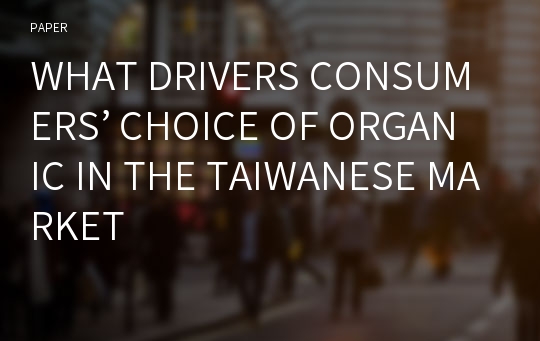WHAT DRIVERS CONSUMERS’ CHOICE OF ORGANIC IN THE TAIWANESE MARKET
* 본 문서는 배포용으로 복사 및 편집이 불가합니다.
서지정보
ㆍ발행기관 : 글로벌지식마케팅경영학회(GFMC)
ㆍ수록지정보 : Global Marketing Conference
ㆍ저자명 : Wei-Chih Tseng, Chun-Hui Chang
ㆍ저자명 : Wei-Chih Tseng, Chun-Hui Chang
영어 초록
With the popularization of the issues of global warming and climate change, more and more people are aware of environmental damages caused by human behavior. The fundamental living necessities of humans, such as food, water, clothing, housing and transportation, all take place on the Earth. Many environmentalists and governments worldwide have started to promote low carbon and green concepts. Such a green urgency is sweeping the world. Based on the surveys conducted by the Organic Trade Association (OTA) in 2013, over 40% of those surveyed in US households have a higher level of motivation to purchase organic products, for the sake of their own and their family's health. In addition, 97% of organic product buyers had purchased organic fruits or vegetables in the past six months. We can also see this kind of situation in Taiwan, where about 80% of consumers are willing to pay more money to purchase environmentally friendly products. The OTA even maintains that, except for Japan, Taiwan is the fastest growing organic market in Asia. Therefore, this study aims to explore the consumers' purchase behaviour behind the organic market in Taiwan. The organic market in Taiwan covers the products from agriculture, food processing, textiles, apparels, and even personal care products and cleaning supplies. Following this green trend that seeks to enhance human health and to maintain a sustainable earth to live on, organic stores in Taiwan have become an emerging industry and there seem to be endless business opportunities in this potential organic market. In order to acquire a significant market share, it is necessary for enterprise managers to understand consumers' perceived value of organic products and how this determinant, perceived value, impact their purchase intention. Perceived value is the overall purchase experience of consumers. It is based on the consumers' comparison between the quality and quantity of products received and paid out, and their objective and subjective consideration of certain factors (Schechter, 1984; Zeithaml, 1988). Perceived value varies with the type of products and services and consumers' personal traits (Zeithaml, 1988). Perceived value is a complicated construct and, therefore, its impact on consumers' purchase intentions toward products cannot be judged from a single dimension only (Bolton & Drew, 1991). Literature on perceived value divides it into utilitarian and hedonic values. Utilitarian value refers to the perceived value acquired by consumers after their purchasing goals have been achieved in the process of consumption. That is to say, utilitarian value is the task- and rationalization-oriented decisions of consumers. On the other hand, hedonic value is affiliated to the individual emotional and irrationality phase of consumers, which usually occur during the process of consumption. Consumers commonly feel pleasant emotions and feelings of motivation and accomplishment, or can even fulfill their desire for escape (Babin & Attaway, 2000; Babin, Darden, & Griffin, 1994; Bae, 2008). Past studies have pointed out that perceived value has a direct impact on the purchase intention (Grewal, Monroe, & Krishnan, 1998). However, in the Value-Attitude-Behavior Model, Homer and Kahle (1988) indicated that perceived value affects consumers' purchase intention through the mediating effect sourced from their attitude. The Theory of Planned Behavior (TPB) has been commonly used to explain a variety of human behaviour (Cunningham and Kwon,2003; Andrews, Silk and Eneli,2010; Kim & Chung, 2011). The TPB mainly focuses on the influence of three behavioural intention dimensions of individuals: attitude, subjective norm and perceived behavioural control. In short, following the fundamental concept of TPB (Ajzen, 1985), this study explored the variables of (1) consumers' attitude towards organic products, (2) the subjective norm, represented by the pressure from family members and close friends, and (3) the perceived behavioural control, presenting perceived ability to control the availability and accessibility of organic products. The ultimate goal of this research is to find out the critical determinants influencing consumers' purchase intentions towards organic products. In order to explore the consumers' possible decisive path from perceived values to purchase intention toward organic products (see figure 1), this study includes the variables utilitarian value and hedonic value as the antecedents, attitude as the mediating factor, and both subjective norm and perceived behavioural control as other influential factors. Figure 1: Conceptual framework and hypotheses This study mainly targeted the consumer behavior toward organic products in the Taipei area of Taiwan. Totally 565 samples were collected. Excluding invalid questionnaires (73 samples), the number of valid questionnaires was 492. The valid response rate was 87%. The SEM is a statistical technique combining both factor analysis and path analysis and is widely used in social and behavioural science studies. Therefore, this study adopted the SEM as the analytical tool to explore the causal relationship among the latent variables discussed above. In sum, this study revealed that the proposed model could well predict consumers’ purchase intentions toward organic products. The empirical research results of this study are summarized as follows. First, the findings of this study confirmed the claims proposed by many scholars that perceived value is a critical determinant affecting the purchase intention of consumers (Zeithaml, 1988). The empirical results of this study show perceived value is an important antecedent driving consumers to purchase organic products in Taiwan. Nevertheless, perceived value is a multi-dimensional construct. As Ryu et al. (2010) suggested in order to explain all consumptive phenomena, we should consider consumers' overall evaluation of utilitarian and hedonic values that are taken into account during their consumption experience. This study found that utilitarian and hedonic values are, indeed, the important driving antecedents for consumers to purchase organic products. Moreover, utilitarian value, compared to hedonic value, has a higher level of impact on the consumers’ purchase intention toward organic products. With regard to the sale of organic products, in addition to the emphasis on the interesting and exciting experience acquired from the purchase or use of organic products, what is more important is that managers can directly emphasize the quality, practical value of organic products, and the contribution that organic products make to people’s health and environmental protection. This not only directly drives consumers to purchase organic products but also further promotes the degree of satisfaction of consumers towards organic products, subsequently increasing the chances for organic products to be purchased. In particular, this study also finds that the main reason for people who never purchase organic products is that they do not yet have a preference toward organic products. For enterprises which want to extend the organic market in Taiwan, this study suggests that managers make consumer to be fond of organic products by driving hedonic and utilitarian value that can be provided by the organic products. Second, the influence of perceived behavioral control and attitude on purchase intention, as mentioned in the TPB in previous studies, was also supported in this study. In other words, when consumers purchase organic products, they have been deeply affected by factors regarding the degree of their knowledge of organic products or the accessibility of the organic products. In that case, the channel strategy and the store coverage of organic products should be very critical in the ever-booming organic products market in Taiwan. Besides, this investigation finds that a certain proportion of consumers do not purchase organic products because they do not understand the organic products, which is also a very important clue for the companies that intend to penetrate the market. They could spread environmental protection knowledge via the advertisements to educate consumers about the benefits (such as protecting the environment, and being good to health, etc.) of the usage of organic products. In that way, the potential consumers could be encouraged to purchase organic products and this will be beneficial for the development of total organic product market.참고 자료
없음태그
"Global Marketing Conference"의 다른 논문
 THE ROLES OF GREEN PACKAGING IN UGLY FOOD PURCHASE INTE..22페이지
THE ROLES OF GREEN PACKAGING IN UGLY FOOD PURCHASE INTE..22페이지 THE IMPACT OF INDUCED AWE ON ETHICAL TOURIST BEHAVIORS5페이지
THE IMPACT OF INDUCED AWE ON ETHICAL TOURIST BEHAVIORS5페이지 A BIBLIOMETRIC ANALYSIS OF SPIRITUAL TOURISM RESEARCH15페이지
A BIBLIOMETRIC ANALYSIS OF SPIRITUAL TOURISM RESEARCH15페이지 SOCIAL NETWORK ANALYSIS AND RESPONSE TIME TESTING: CONS..11페이지
SOCIAL NETWORK ANALYSIS AND RESPONSE TIME TESTING: CONS..11페이지 THE EFFECTS OF PARA-SOCIAL INTERACTION ON ONLINE CELEBR..3페이지
THE EFFECTS OF PARA-SOCIAL INTERACTION ON ONLINE CELEBR..3페이지 THE INFLUENCE OF OPINION LEADERS ON DAILY DEALS USER’S ..3페이지
THE INFLUENCE OF OPINION LEADERS ON DAILY DEALS USER’S ..3페이지 HOW IMMERSIVE RETAILING AFFECTS CONSUMERS’ URGE TO BUY:..6페이지
HOW IMMERSIVE RETAILING AFFECTS CONSUMERS’ URGE TO BUY:..6페이지 KEY TO SUPERSTARDOM IN A GLOBALISED MARKET: THE ROLE OF..6페이지
KEY TO SUPERSTARDOM IN A GLOBALISED MARKET: THE ROLE OF..6페이지 A POST-PANDEMIC LOOK AT TOURISTS’ PERCEIVED COOLNESS OF..4페이지
A POST-PANDEMIC LOOK AT TOURISTS’ PERCEIVED COOLNESS OF..4페이지 EXTRACTING OFFLINE RETAIL SHOPPING PATTERNS: OLLABORATI..5페이지
EXTRACTING OFFLINE RETAIL SHOPPING PATTERNS: OLLABORATI..5페이지


















